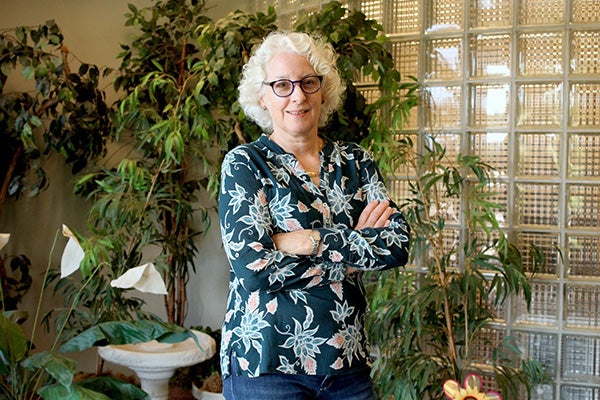Jean Gordon is expert in neurogenic speech disorders, mechanisms of language
The University of Rhode Island Department of Communicative Disorders welcomes Jean Gordon as its new chair to begin the 2023 fall semester.
Gordon comes to the URI College of Health Sciences from the University of Iowa, where she was an associate professor of communicative disorders and a faculty member in the neuroscience program. She has extensive experience in her field, having previously served as editor-in-chief of the Journal of Communication Disorders. Gordon also serves on the publication’s editorial board as well as that of the journal, Aphasiology.
A certified speech-language pathologist, Gordon is interested in the mechanisms of language breakdown and recovery after a stroke or other brain injury. Her research focuses on spoken language production, and how it changes with normal aging or with the onset of neurogenic language disorders such as aphasia, the loss of the ability to understand or express speech. As a psycholinguist, she is interested in the mechanisms by which words are organized and produced in the brain, the factors contributing to fluent language production, and how these change with aging.
Gordon is an expert in measuring speech and language abilities and in interpreting findings from populations with communicative disorders relative to typically aging adults. She has examined the use of verbal fluency to identify Alzheimer’s dementia in relation to typical aging, and studied language deficits in individuals with aphasia.
“Earlier in my career, I was focused on figuring out the nature of disorders like aphasia. Now I want to take that and apply it to seeking treatments,” Gordon said, noting one goal is to change the way speech fluency is rated and evaluated. “Fluency in speech is something that is difficult to define. Is it word retrieval? Is it formulating sounds? Is it figuring out what to say? The goal is to identify the underlying reasons fluency is affected. Hopefully, it will lead to better treatment outcomes.”
Interim Dean Deborah Riebe welcomed Gordon to the department, noting she intends to build upon the College of Health Sciences’ already robust research programs.
“We are thrilled to welcome Jean Gordon to the Department of Communicative Disorders,” Riebe said. “An expert in aphasia, she has over 25 years of experience in clinical practice and higher education. We look forward to the impact that Jean will undoubtedly make on the department.”
The College’s Department of Communicative Disorders focuses on the science behind communication problems and their development, and how to treat children and adults with speech, language and hearing issues. Students learn about the anatomical, neurological, linguistic, and cultural processes underlying communication and communication disorders. A bachelor of science degree from the program provides a solid foundation for advanced degrees in speech-language pathology, audiology, and other health and education related fields. The program’s master of science degree prepares students to practice as speech-language pathologists.
The department also offers full-service Speech and Hearing Centers, which serve people on campus, as well as the outside community, in both Kingston and Pawtucket. Communicative disorders students—under the supervision of faculty members—treat children to older adults for hearing problems and speech issues, ranging from stuttering to communications problems brought on by neurological disorders, including stroke or dementia.

